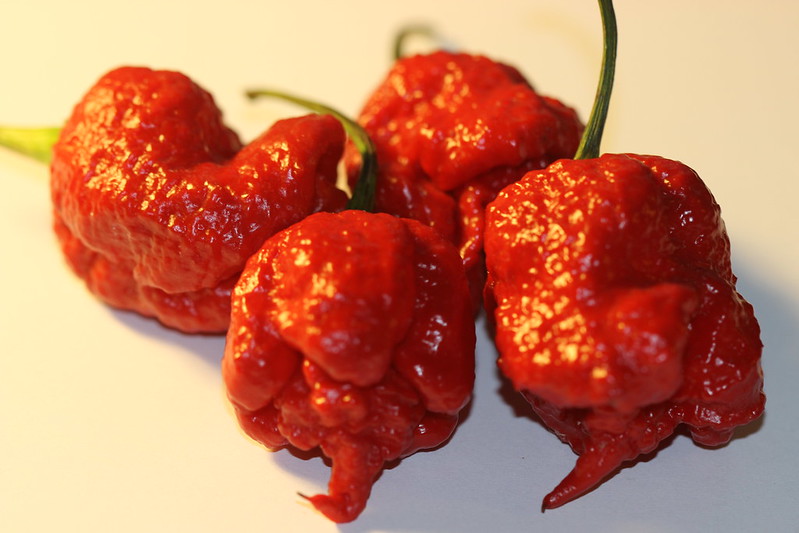Introducing Some of the Hottest Siblings You May Not Know About
When you think of the hottest siblings on the planet, do you think of the Hemsworth brothers or the Kardashian sisters? In the world of celebrities, hotness is relative and hard to measure. In the world of super-hot chili peppers, hotness is measured in Scoville Heat Units and can be scientifically tested. When making super-hot chili peppers is your business, protecting your intellectual property (IP) is a spicy subject.

A year ago, the Guinness Book of World Records announced a new hottest hot chili pepper record holder: the Pepper X! The Pepper X beat out the previous champion, the Carolina Reaper, which had held the record for over a decade.
The Carolina Reaper and the Pepper X are siblings, but not genetically as far as we know. In fact, the Pepper X genetic makeup is a big secret. However, the Carolina Reaper and the Pepper X are at least siblings in that they were both developed by the same parent: Ed Currie and his company, PuckerButt.
When PuckerButt’s Carolina Reaper was the reigning hot chili pepper champion, the company’s protections over the Reaper were limited. But the Carolina Reaper – and the results of its lack of protections – taught Currie and the PuckerButt team about the benefits of an IP strategy. Specifically, the Carolina Reaper taught Currie and PuckerButt about patent protection.
Ten years later, Pepper X is PuckerButt’s next big invention. Having been officially named the hottest chili pepper in the world, this pepper is highly sought-after! Now, the company has a second shot to get the IP strategy right.
There are multiple ways to legally protect the profitability of a plant invention like PuckerButt’s chili peppers. Trade secrets can be kept so that competitors don’t know what PuckerButt is up to. Patents can be filed to protect the plant as an invention. Plant variety protection certifications can be pursued.
Pssss: Spicy Secrets
Trade secrets are a method of IP protection in which the trade secret holder keeps a method of production or a product itself hidden so that others cannot copy it. Trade secrets can protect IP indefinitely or until a patent is filed. Accidental or intentional disclosure of a trade secret to the outside world means that the trade secret isn’t protected any longer.
PuckerButt uses trade secrets: it has over 30 secret locations for growing and breeding plants. Currie even props up cameras to capture the identities of any uninvited visitors. But trade secrets for actual plant genetics are very difficult to keep secret, since plant seeds contain the genetic material which can be replanted to grow the plant. Specifically, trade secrets didn’t protect the Carolina Reaper since PuckerButt disclosed the invention – its genetic material – to the world by selling seeds.
Where disclosure of a trade secret means it is no longer protected, disclosure is a requirement for protection by a patent.
The Patent Options: Pepper Plant Protections
There are two main kinds of patents that can protect PuckerButt’s peppers; utility and plant patents. Either kind of patent requires that an invention must be new, useful, non-obvious, and patentable subject matter.
Useful plants are plants that are grown for food – like chili peppers – or might be useful as home décor because of a special appearance. Non-obviousness means that someone with ordinary skill in the arts could not easily create the plant based on prior knowledge and call it a new invention. Generally, the requirements for usefulness and non-obviousness are met for plant patents. It is the novelty requirement that is most critical.
To be novel, a plant invention cannot have been in public use, on sale, or otherwise available to the public prior to the effective filing date of the patent application to the United States Patent and Trademark Office ((with certain exceptions). This is why PuckerButt has to be careful with how it uses and sells its peppers until PuckerButt files a patent.
A novel plant invention – a certain appearance like color, or function like ability to grow with certain pesticides – that can be used to identify it. Here, being the world’s hottest chili pepper is a unique characteristic!
Finally, patentable subject matter means that the invention fits into the category of types of inventions for which the USPTO will offer a patent for. Plants can be protected by patents, but not all plants are protected. For example, plant patents only protect cultivated plants – plants grown in an area under a person’s care (like our case), even if the new variety was accidentally created.
Patentable subject matter also requires distinction between plant patents and utility patents. In the world of plants specifically, utility patents only protect sexually reproduced plants –entirely new species with a new genetic makeup. Sexually reproduced plants are built by cross-breeding two different kinds of plants. PuckerButt does this to make a new pepper species by using paintbrush-like tools to collect pollen from the stamen (male sex organ in a pepper flower) of one pepper variety and brushing the pollen over the carpel (female sex organ in the flower). Sexy!
Because PuckerButt makes new hybrids using the sexual reproduction process, assuming the hybrids meet other utility patent requirements, utility patents are an option for these hot hot chili peppers.
The second way to protect a plant is with a plant patent. Plant patents protect plants that would otherwise not be able to be patented. For example, asexually reproduced cultivated hybrids – a hybrid that someone creates but without sexual reproduction techniques like the ones described above –can be protected with a plant patent.
Asexual plant reproduction is the type of reproduction that occurs when a plant clone is made, rather than a new plant grown from a seed. In gardening and farming, a popular method of asexual plant reproduction is plant cutting. Plant cutting is where a new plant is propagated from a piece of an older plant and replanted. In asexual reproduction techniques like plant cutting, a clone is created. It’s a great way to share your plants with friends!
Plant patents might be easier to get, because they do not require the same sexual reproduction requirements as a utility patent. A plant patent requires that the plant be asexually propagated, new, and have at least one distinct feature showing that it is a new variety.
But plant patents also offer less protection. Specifically, the plant patent only protects a single plant and its asexually reproduced children – plants with exactly the same genetics as the patented plant.
Patent protection matters because a patent gives a patent holder an EXCLUSIVE right to sell, use, and reproduce the plants they hold patents for. For both utility and plant patents, that timeframe for exclusive rights is 20 years.
The Carolina Reaper’s IP History
Currie has said in interviews that he started selling the Carolina Reaper – the whole plant with seeds intact and the seeds themselves – before all his IP protections were in-place. He probably meant that he began selling the Reaper before filing for a patent.
In other words, this means competitors can create new chili peppers, including the unprotected Carolina Reaper. This is not hard; they need only to buy Carolina Reaper seeds or a plant with intact seeds to grow their own. Currie learned that his peppers were showing up in others’ products without authorization, and the seeds were being sold, too. For example, sellers of Carolina Reaper seeds on Amazon include: Pepper Joe’s, Seed King Express, and Sherwood’s Seeds – none of which are connected to Currie or PuckerButt. Said Currie: “I didn’t listen to the lawyers when I released the seeds for the Carolina Reaper. I was trying to get some money in the bank.”
Patents can be expensive, both to file for them and to protect them. However, trade secret protection and patent protection are important because they give the ability to prevent other businesses like Pepper Joe’s from selling Carolina Reaper seeds. In turn, this helps protect future profitability. Because Currie has talked about wanting to pass PuckerButt on to his children, patent protection could help ensure that PuckerButt continues to hold the exclusive right to sell some of the hottest chili peppers in the world for two decades.

PuckerButt’s Pepper X: A Different Strategy for Protection
At 2,693,000 Scoville Heat Units, Pepper X is now the hottest chili pepper on the planet, according to the Guinness Book of World Records.
PuckerButt has learned its lesson. When Pepper X was developed, PuckerButt was careful to not sell any seeds. This way, they can sell their hot sauce made with Pepper X and not reveal the genetic material of the plant itself – this will keep Pepper X eligible for patent protection.
Although PuckerButt’s innovation involves sexual reproduction of his chili peppers, PuckerButt uses multiple generations of seed-based and asexual reproduction of new hybrids in order to “stabilize” a new hybrid and ensure that the characteristics show up in each new crop. This means that either type of patent would probably be an option for PuckerButt’s peppers.
Pepper X can choose between filing a utility and a plant patent. Given that Pepper X likely qualifies as a sexually reproduced hybrid, Pepper X should pursue a utility patent since utility patents offer slightly broader protection.
PuckerButt plans to sell seeds only after the patent is issued, and is working on the patent application process. Even though it will take longer to bring the Pepper X plant and seeds to market, the future is promising that PuckerButt will have exclusive rights to sell the Pepper X plant for decades to come. This strategy is a slower burn but ultimately hot, hot, hot!

